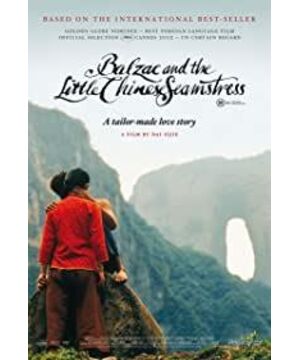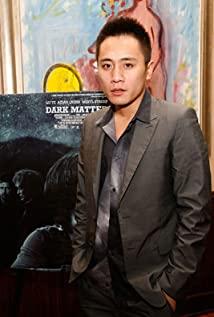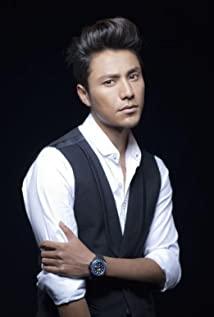The film I watched in the film and television appreciation class that year, and the feelings I wrote later, probably happened four and a half years ago. The following text:
"Poor Christopher, the interest in freedom is something you can't know, it's worth the pain, danger, and even life in exchange. Freedom, feeling that all the hearts around you are free, even the shameless. Inside, it was an indescribable pleasure. It was as if your soul was swimming in the boundless space, so that the soul could not live anywhere else." This is Ma Jianling copied in a sheepskin vest, from "John Cleese" Fu Lei's translation of "Dofu" is also the one he used to persuade the doctor to have an abortion for the little tailor. Many people were moved by this scene in the movie, and I was no exception.
The story between Luo Ming and Ma Jianling, the two educated youths and the little tailor, happened in such a ridiculous age. It was an era in which black and white were striving to be clear, but black and white were reversed. At that time, poverty was glorious, and knowledge was shameful. This can be seen from the performance of the production captain. In his sermons, it is always difficult to avoid "showing off" the title of "poor and lower-middle peasant". He hates culture. When Luo Ming first came, he ordered him to read a recipe, and then And personally tore it up and burned it. At that time, it was an era when everyone had to live carefully. Mozart's Sonata is not easy to mention, unless its title is "Mozart Loves Mao Zedong". Everything about capitalist countries is hard to talk about, Balzac was originally from Albania. It was also an era of ignorance and rudeness. The progressive youth who was commended said, "Under my whip, the buffalo has become docile and lovely." A truth, everything is done according to the rules, no resistance is tolerated, and if you don’t obey, you have to obey.
I can still remember a scene in the movie, Ma Jianling said excitedly after watching "Usur Miroi", "I think everything has changed, the sky, the stars, the sound, the light, and even the smell of the pigsty has changed. It's over!" He then shouted at Wanshan, "Usul Miroe!". In the echo of Wanshan, I really felt his joy, but also felt the helplessness of reality. A young man, standing in a place separated from the civilized world, uttered a cry, and in the distance, the mountains are stacked and misty.
In my opinion, this movie is about two young people, with an alarm clock, a violin, and a suitcase full of books, in such a double cage of reality and spirit to save a young girl s story. What I see from this is the young people's resistance to the shackles of human nature and their desire for a free life. What these two young men saved the little tailor was first emotion, then thought. As the saying goes, "Barbarians have only emotions, and civilized people have thoughts in addition to emotions." The little tailor has become a "civilized man".
In the 14th century, Europe began the Renaissance, advocating the liberation of human nature and respecting people's normal desires. In the 17th century, the Enlightenment movement began, advocating "rationality" and "science", and drawing a blueprint for the future society. The little tailor's path is somewhat similar. The release of her passionate love and desire with Luo Ming was her first resistance. And after she had an abortion at great risk, when Ma Jianling took her back, she told him that she seemed to have changed and was no longer her. I think, at that time, she was already framing her future blueprint, she had her real thoughts.
Finally, the little tailor took Balzac's words "A woman's beauty is priceless" and left Phoenix Mountain. In fact, her change was by no means abrupt. She often saw many planes fly over the top of the mountain, so she pinched many models of the planes in her spare time; she was very interested in Luo Ming's alarm clock with a moving cock, so she stole it and took it apart; she was at the commendation meeting , told Luo Ming and Ma Jianling that she hated that official the most. From the above plot, it can be seen that the little tailor is "not bad". She yearns for the outside world, she is full of curiosity about new things, and she also has a spirit of rebellion. But at first, she still didn't dare to show her "irrational thoughts", so she kept complaining, "You people in the city are so comfortable!". But slowly, her resistance came to the fore. In one episode, grandpa called her to say that she had made a new dress for her, but she turned away inexplicably unhappy. Later, she made her own clothes, which shocked her grandfather and asked the two educated youth to stop telling stories to her granddaughter. Then, there is the episode of abortion. After the abortion, she lay on the bed and shed tears silently. At that time, she might have known that her life would not change qualitatively until she got out of the mountains. So in the end, she took such a sentence and flew away. Speaking of this, I remembered another scene, that is the scene when Luo Ming and Ma Jianling visited the little tailor, and the little tailor looked in the mirror. The simple act of looking in the mirror may also indicate that from that moment on, she began to look at herself and realized her worth.
Luo Ming is enthusiastic and clever, dares to love and hate, and has a more distinctive personality, while Ma Jianling is deep and reserved, or a bit "suffocating". They both love little tailors, but they love in different ways. Some people say that the little tailor is merciless, two people love her so much, but she finally chooses to run away alone. However, I feel that this ending just avoids the movie from falling into a cliché, and even sublimates the theme. Luo Ming felt that she was the most beautiful girl here, so he decided to chase her, but he thought she was dirty and wanted to change her. In his eyes, she was still a girl in the mountains after all. The little tailor ran away with the phrase "a woman's beauty is priceless", which reflects the awakening of women's independent consciousness and their pursuit of their own status and value. And more importantly, her behavior tells us that if we want to break free from the cage, we must first break free from the shackles in our hearts and destroy those stereotypes. There is a saying, "In order to be free, you must wear hard armor." It is admirable that the little tailor has the courage to fight against the mighty forces of society. Some people guess that she later went to Shenzhen, to Hong Kong, I don't think she could have a good life at first, but I believe she will have a good life. Luo Ming and Ma Jianling injected vitality into Phoenix Mountain. When people sat around listening to their movies with tears in their eyes, when an old tailor was fascinated by stories, and when a new fashion trend emerged in Phoenix Mountain, I saw it. At the dawn of the victory of these young people's struggle, and the little tailor, she is the brightest one.
I haven't been through the Cultural Revolution, so I can't really understand the thirst for knowledge of people with lofty ideals. All I know is that Hegel said, "The ignorant man is not free, because the opposite of it is a strange world."
Shen Congwen's "Border Town" exudes admiration for the healthy beauty of human nature in Western Hunan, and the sadness that such a simple and clean life has been invaded by modern civilization. It is also inevitable. But as mentioned above, if things want to achieve development, they always have the courage to destroy something.
Some people say that "Balzac and the Little Tailor" is too outrageous compared to reality, or that the plot is flawed, but I want to say that I still like this movie, at least it brought me the above. think.
View more about Balzac and the Little Chinese Seamstress reviews










